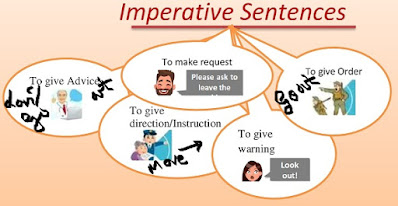Lesson of Passive of Commands (or) Orders (Or) Imperative Sentences Subject English Grade 9th
Lesson of Passive of Commands (or) Orders (Or)
Imperative Sentences
Subject English
Grade 9th
Students` Learning Outcomes
- If the verb in the active voice expresses ‘order’, ‘requests’, ‘advice’ etc. The word ‘Let’ is usually placed at the beginning of the passive voice and the ‘be’ verb is placed before the past participle of the main verb. Another form of the passive is with the word ‘should’ + ‘be’ or wly. But if the sentences begin with ‘please’ in active voice, ‘you are requested to’ is used in the passive voice. An intransitive verb may also be changed into passive with ‘you are requested to’ / advised to’, etc. such a passive voice of an intransitive verb may be called an indirect passive.
- Passive: Let + Object + be + Past Participle of the Verb [or, (should) be / get + P.P.)
|
Active
|
Passive
|
|
Do
this work. |
Let
this work be done. |
|
Open
the door. |
Let
the door be opened. |
|
Shut
the door. |
Let
the door be shut. |
|
Tell
him to go. |
Let
him be told to go. |
|
Keep
your word. |
Your
word should be kept. |
|
Obey
your teacher. |
Your
teacher should be obeyed. |
|
Love
the children. |
The
children should be loved. |
|
Prepare
for the worst. |
Be
(Get) prepared for the worst. |
|
Please
do this work. |
You
are requested to do this. |
|
Please
keep off the grass. |
You
are requested to keep off the grass. Or The grass should be kept off. |
|
Please
go there. |
You
are requested to go there. |
|
Please
don`t smoke. |
You
are advised not to smoke. |
|
Go
home. |
You
are advised to go home. |
|
Do
it at once. |
You
are ordered to do it at once. |
Modal auxiliary + be +
iii form, as;
|
Active |
Passive |
|
Can
speak |
Can
+ be + spoken |
|
Could
use |
Could
+ be + used |
|
Should
obey |
Should
+ be + obeyed |
|
Would
ruin |
Would
+ be + ruined |
|
May
tell |
May
+ be +told |
|
Might
sell |
Might
+ be + sold |
|
Must
send Ought
to do. |
Must
+ be + sent Ought
to +be + done |
- Note: The Passive Voice
of some intransitive Verbs by adding ‘you are advised to ‘/ ‘you are ordered
to’ / ‘you are requested to’ may be treated as ‘Indirect Passive’.
- ‘Let’ in Active and Passive:
- ‘Let’ may be used in both Active and Passive Voice.
- ‘Let’ takes the Objective-type of pronouns (me, us, him, her, and them)
- ‘Let’ may be replaced by ‘may be allowed’ in the Passive Voice, as;
|
Active
|
Passive |
|
Let
him buy a motor car. Let
us forget the quarrel. Let
him go. |
Let
a motor-car be bought by him. Let
the quarrel be forgotten (by us). He
may be allowed to go. |
- In the Nut Shell, an Imperative Sentence is changed from active to passive voice according to the message contained in the sentence. For this purpose words used are as follows:
- If it contain an order or a command then you are ordered to, or you are commanded to.
- If it contains a request then you are request to.
- If it contains a advice then you are advised to
- If it contains a negative order then you are forbidden to.
- If it contains ‘Let us’ then it is suggested that we should or it is proposed that we should, such sentences are changed by using ‘Let’ also as let object be third form of verb, as; learn this lesson. Turn into let this lesson be learnt.




Comments
Post a Comment